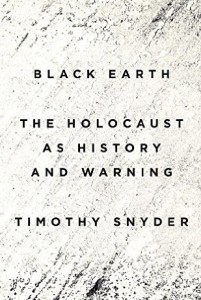Timothy D. Snyder
Black Earth: The Holocaust as History and Warning
©2015 TIM DUGGAN BOOKS, 462 pages
A young friend recently told me that he’d been watching a History Channel documentary on the Nazis. “Boy, they really did some horrible things.” He wasn’t joking. He was serious. He knew just about nothing about those days.
He is one generation younger than me. I grew up in the sixties, World War II was very real for us. Friends’ fathers fought in it. Our parents’ lives had been immersed in it. The old movies and cartoons we watched were from the war years. Movies and TV shows, dramas and comedies, took place in WWII. Even here in WASPy Oregon I had friends and schoolmates whose parents and grandparents and families escaped the Holocaust. Jerry’s father’s legs were machine-gunned when escaping from a cattle car heading to Auschwitz, leaving deep pockmarks. Men and women came to our classes telling of the death camps, the Holocaust, and the reign of the Nazis—and Germans. They showed us their tattooed numbers. We read The Diary of Ann Frank and The Hiding Place and others books of survival and heroism during those years, and we watched the movies. We asked ourselves where we would hide the Jews if it ever happened again. Americans my age and older ask themselves this still.
The Holocaust is real to us, but not to younger people. What is especially troubling with this young man is that he grew up and was schooled in Copenhagen. Denmark, the only nation deemed righteous at Yad Vashem for their rescue of the Jews during Nazi occupation—and he knew nothing and now knows little about World War II, the Nazis, the Holocaust, or even the role that Denmark played in it. How to account for ignorance of something so profound?
History, forgetting and repeating. We must not let this horrible event fade. We need books like Timothy D. Snyder’s Black Earth: The Holocaust as History and Warning. Books like it, though perhaps not it.
Yale scholar Snyder’s research and writing is on the bloodied countries between the Third Reich and Soviet rule, and how the ideologies, personalities, and manias of both sides played out there. Specifically here, the tens of millions murdered, including in the Holocaust atrocities. Having lived years in the area, I eagerly anticipated this book.
Snyder’s credentials are long and impressive, and he writes well. Unfortunately, it was a read too easy to put down. It isn’t dry. It is, almost, trivial—a quick narrow survey played out long and self-important. It is reminiscent of a History Channel or Nat Geo version of history: little meat, lots of simple carbs.
Snyder focuses less on anti-Semitism as the reason for the Holocaust and more Hitler’s racial Darwinism—a survival of the fittest struggle between human races or breeds, necessary to improve, clarify and evolve bloodlines, and to claim dominance. Hitler wanted the German breed to be top dog, dominating and/or annihilating lesser breeds.
Snyder emphasizes a happenstance nature of the Holocaust, all due to the “benefits” of unexpected consequences of German and Soviet actions. Snyder’s seeming belief is that when circumstances aligned, and only then, did it occur to those with the power to begin their wholesale extermination of specific peoples.
Snyder argues correctly that rendering a people stateless, by doing away with their government and state, leaves a people vulnerable, unprotected. Hitler and Stalin both did so, and Hitler went further, designating some people as nonhuman (i.e., Jews and Roma), others as less-than human (Slavs), and others defective, weakening the race (homosexuals, mentally ill, handicapped).
I am disappointed in and don’t recommend the book, especially to anyone new to the history of the era; there are others better. Snyder narrows in on some aspects of the events more than most who study the subject do—but probably not reasonably. Snyder’s are not new revelations or thinking.
His last chapter is his warning from his title and is perhaps the most trivial. He goes off-subject with a breathless, pop anthropogenic climate change plea. Here he could have tied it all together—but didn’t, diminishing the whole.
The vulnerability of statelessness and dehumanizing does indeed have pertinent relevancy today. The collapse of states in the Middle East, Africa and throughout the Muslim world has made the peoples vulnerable. Their migration and violent unrest gets them labeled as other, less-human: vulnerable. The self-dismantling states of the Western World, crumbling into totalitarian regulatory bureaucracies are making their citizens vulnerable to invasion, destructively disordered mass-immigration, and unsure of their leaders’ commitment to their safety. The polarization within our nations and the rise of activists on the Left has encouraged the delegitimizing of categories of people directly and in reaction, making us all vulnerable.
There are warnings in Holocaust history—Snyder, though, does little to provide them.
Mike Scoggin lives, writes, edits and illustrates in the Pacific Northwest
Photo Credit: Entrance to Auschwitz II (Birkenau) in Poland, via Pixaby






